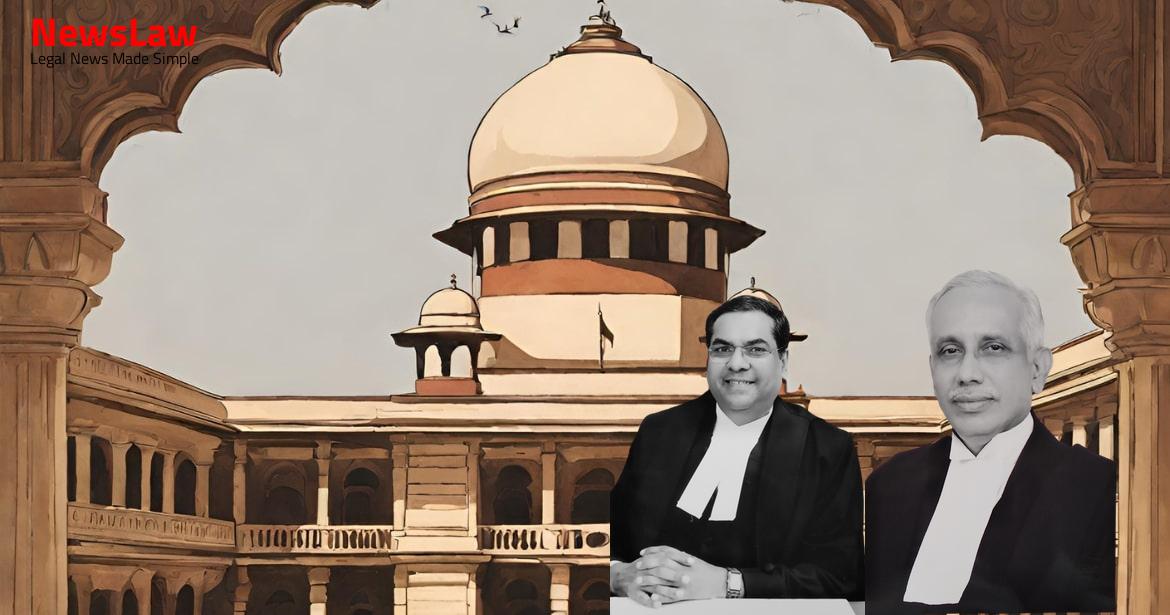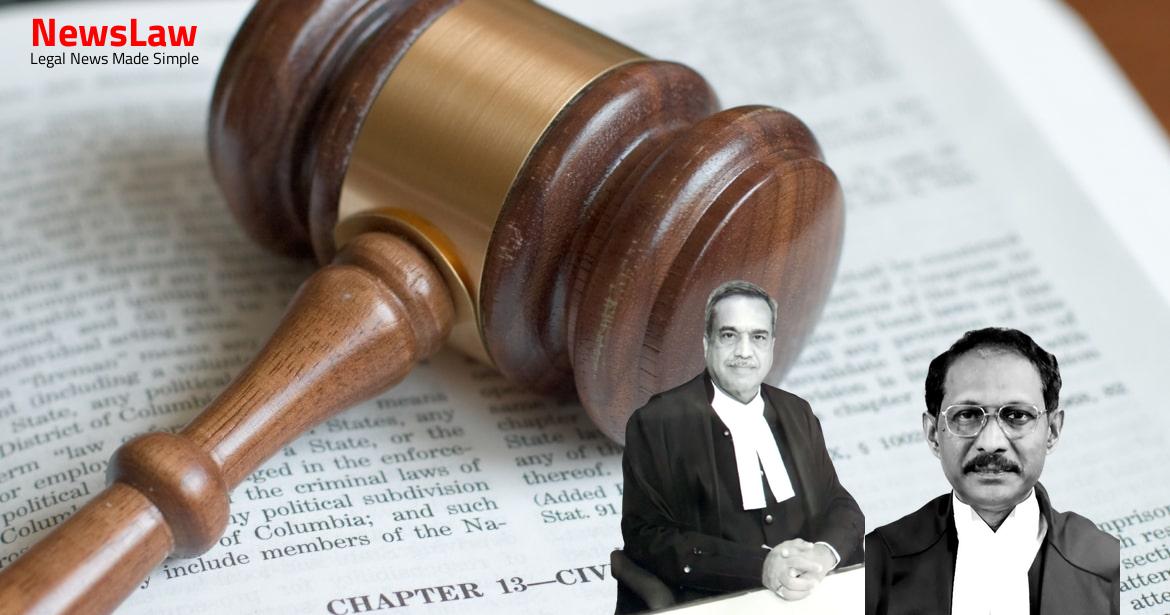No.199 of 2014 by further directing that the document in question shall be received in evidence in the suit for specific performance, the original defendant has preferred the present appeal.
Also Read: https://newslaw.in/case-type/civil/c-a-no-001144-001146-2011/
The learned Trial Court held the preliminary issue in favour of the defendant and against the plaintiff by observing that the unregistered Agreement dated 10.09.2013 shall not be admissible in evidence. 3 The impugned judgment and order passed by the High Court directing to receive the unregistered Agreement to Sell in evidence in a suit for specific performance, the original defendant has preferred the present appeal. It is submitted that it is an admitted position that the Agreement to Sell dated 10.09.2013 which is the foundation or basis of the suit is an unregistered Agreement to Sell and therefore cannot be exhibited in evidence for the main purpose in the suit, in view of the Tamil Nadu Amendment to Section 17 of the Registration Act making an Agreement to Sell to be compulsorily registered with effect from 01.12.2012. As per Section 17(2)(v) of the Registration Act with reference to Section 1(b) and (c), that an agreement/document simplicitor merely creating a right to obtain another document, was saved from compulsory registration.
4 It is submitted that as per Section 49(a) and (c) of the Registration Act, a document requires to be registered, if not registered shall not affect the immovable property comprised therein and shall not be received as evidence of any transaction affecting such property. 5 It is further submitted by the learned counsel for the defendant that if the interpretation of the Hon’ble High Court given in the impugned order is followed, then the same would render the Amendment Act, 2012 otiose and meaningless, simply because the situation before the said amendment was exactly as has been laid down in the impugned order.
6 It is submitted that after introduction of a specific provision relating to Agreement to Sell in Section 17(1)(g) of the Act, and in the absence of any amendment in Section 17(2) to include clause (g) also within its fold, Section 17(2)(v) will only operate in relation to documents covered under the general provision of Clauses (b) and (c) of sub-section (1). 1 It is submitted that as rightly observed and held by the Hon’ble High Court though Section 17(1) of the Registration Act has been amended by the Tamil Nadu Act, 2012 by inserting Section 17(1)(g), making the Agreement to Sell/ Agreement affecting any immovable property compulsorily required to be registered, there is no corresponding amendment to Section 49 more particularly proviso to Section 49 of the Registration Act. While answering the aforesaid issues and appreciating the submissions made by learned counsel appearing on behalf of the respective parties, Section 17 of the Registration Act, 1908, as applicable prior to the Registration (Tamil Nadu Amendment) Act, 2012 and Section 17 post Amendment Act, 2012, are required to be referred to which are as under.
Documents of which registration is compulsory.—(1)
Also Read: https://newslaw.in/case-type/civil/acquisition-of-land-and-deemed-lapse-under-the-act-2013/
The following documents shall be registered, if the property to which they relate is situate in a district in which, and if they have been executed on or after the date on which, Act No XVI of 1864, or the Indian Registration Act, 1866, or the Indian Registration Act, 1871, or the Indian Registration Act, 1877, or this Act came or comes into force, namely:— (a) instruments of gift of immovable property; (b) other non-testamentary instruments which purport or operate to create, declare, assign, limit or extinguish, whether in present or in future, any right, title or interest, whether vested or contingent, of the value of one hundred rupees and upwards, to or in immovable property; (c) non-testamentary instruments which acknowledge the receipt or payment of any consideration on account of the creation, declaration, assignment, limitation or extinction of any such right, title or interest; and (d) leases of immovable property from year to year, or for any term exceeding one year, or reserving a yearly rent; [(e) non-testamentary instruments transferring or assigning any decree or order of a Court or any award [(1A) The documents containing contracts to transfer for consideration, any immovable property for the purpose of section 53A of the Transfer of Property Act, 1882 (4 of 1882) shall be registered if they have been executed on or after the commencement of the Registration and Other Related laws (Amendment) Act, 2001 (48 of 2001) and if such documents are not registered on or after such commencement, then, they shall have no effect for the purposes of the said section 53A.] (2) Nothing in clauses (b) and (c) of sub-section (1) applies to— (i) any composition deed; or (ii) any instrument relating to shares in a joint stock Company, notwithstanding that the assets of such Company consist in whole or in part of immovable property; or (iii) any debenture issued by any such Company and not creating, declaring, assigning, limiting or extinguishing any right, title or interest, to or in immovable property except in so far as it entitles the holder to the security afforded by a registered instrument whereby the Company has mortgaged, conveyed or otherwise transferred the whole or part of its immovable property or any interest therein to trustees upon trust for the benefit of the holders of such debentures; or (iv) any endorsement
[any document other than the documents specified in sub-section (1A)] not itself creating, declaring, assigning, limiting or extinguishing any right, title or interest of the value of one hundred rupees and upwards to or in immovable property, but merely creating a right to obtain another document which will, when executed, create, declare, assign, limit or extinguish any such right, title or interest; or (vi) any decree or order of a Court [except a decree or order expressed to be made on a compromise and comprising immovable property other than that which is the subject-matter of the suit or proceeding]; or (vii) any grant of immovable property by [Government]; or (viii) any instrument of partition made by a Revenue-Officer; or (ix) any order granting a loan or instrument of collateral security granted under the Land Improvement Act, 1871, or the Land Improvement Loans Act, 1883; or (x) any order granting a loan under the Agriculturists, Loans Act, 1884, or instrument for securing the repayment of a loan made under that Act; or [(xa) any order made under the Charitable Endowments Act, 1890 (6 of 1890), vesting any property in a Treasurer of Charitable Endowment
Section 17(1) (g) as inserted by Tamil Nadu Amendment Act, 2012, reads as under : “ 17(1)(g) instruments of agreement relating to sale of immovable property of the value of one hundred rupees and upwards.” Thus, on and after the Tamil Nadu Amendment Act, 2012, as per Section 17(1)
(g), instrument of agreement relating to sale of immovable property of the value of Rs.100/- and upwards is required to be registered compulsorily.
Also Read: https://newslaw.in/case-type/civil/c-a-no-003481-003481-2022/
Effect of non-registration of documents required to be registered.—No document required by section 17 [or by any provision of the Transfer of Property Act, 1882 (4 of 1882)], to be registered shall— (a) affect any immovable property comprised therein, or (b) confer any power to adopt, or (c) be received as evidence of any transaction affecting such property or conferring such power, unless it has been registered: [Provided that an unregistered document affecting immovable property and required by this Act or the Transfer of Property Act, 1882 (4 of 1882), to be registered may be received as evidence of a contract in a suit for specific performance under Chapter II of the Specific Relief Act, 1877 (3 of 1877), *** or as evidence of any collateral transaction not required to be effected by registered instrument.]” 10. At this stage, the primary statement of objects and reasons to the Tamil Nadu Amendment Act, 2012, is also required to be referred to and considered.
Case Title: R. HEMALATHA Vs. KASHTHURI (2023 INSC 336)
Case Number: C.A. No.-002535-002535 / 2023



